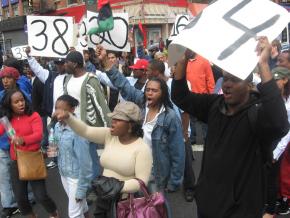Fifty shots and found not guilty
The criminal justice system's biases were boldly set forth as principles upon which the police officers who killed Sean Bell were exonerated.
ON APRIL 25, a New York City judge found three police officers "not guilty" for shooting 50 times at three unarmed men in a car.
Sean Bell is dead, Joseph Guzman was shot 13 times, Trent Benefield was shot three times--but the police, according to Judge Arthur J. Cooperman, were not guilty...of anything. Although they were firing at close range, more than half of the shots didn't even strike the car! But no, they were not even guilty of reckless endangerment, says the judge.
It's not that this verdict was a big surprise. It wasn't. The NYPD has a long history of targeting, brutalizing and killing Black people with impunity. Amadou Diallo, also unarmed, was killed in the vestibule of his apartment in a hail of 41 bullets. Forensic examination revealed that some of those bullets entered the soles of his feet or tunneled up his legs as he lay on the ground. The verdict? "Not guilty."
So no, the Sean Bell verdict wasn't anything new. But it still hurt.
Judge Cooperman didn't just say "not guilty." He wrote a 1,165-word decision. He went out of his way to explain his reasoning. Here, the longstanding bias of the criminal justice system against working-class people and people of color was boldly set forth as the principles upon which the police were exonerated.
For starters, Cooperman admitted that the actions of the victims were important to him, not their "mindset." This was an obtuse reference to the question of whether or not police identified themselves, a question that goes otherwise unmentioned in the document.
Ask yourself: What would your mindset be if someone in jeans and a jacket (i.e., not a uniform) approached your car at 4 a.m. with a gun drawn? Would you roll down the window to hear what they had to say? Or would you step on the gas to escape?
The supervising lieutenant testified that he didn't hear the officers identify themselves. Well, it doesn't matter, says the judge. What does matter is what the police thought!
More to the point, Cooperman cites the criminal background of some of prosecution's witnesses, and their "demeanor" on the witness stand as crucial elements undermining their credibility. They had "an interest in the outcome of the case," the Judge wrote, "a motive...to lie." And the police didn't?
Ask yourself, if your best friend was killed while sitting next to you--if you were shot 13 times and came to the witness stand with four bullets still stuck in your flesh--what would be your "demeanor"?

Yes, Joseph Guzman has a criminal record. And thanks to the "war on drugs" dragnet, nearly one out of every three Black men in this country do, too. We're setting records for the speed with which we're removing people from the ranks of the "credible." And at least half of the 2 million people rotting in American prisons today are put there for nonviolent offenses.
It's getting easier and easier to wind up with a record these days. And once "touched" by the system, for whatever reason, you are utterly disposable. Some 13 percent of all Black men already can't vote because of laws that take away their right because of prior felony convictions. Forget about democracy; once branded, your life has become that much cheaper.
WE ABOLISHED slavery. We broke the back of Jim Crow in the South. But we continue to live and die at the mercy of a criminal justice system that seems stacked against us. Here is the civil rights challenge for our generation.
There have been at least three different protest marches since the Sean Bell verdict was announced, and there will hopefully be more in the days to come. Rev. Al Sharpton has vowed to work with unions, churches and community leaders to "close the city down." That would be a great step in the right direction.
Everyone knows that bullies don't stop their bullying until you stand your ground. It's time we stood our ground and fought for justice. Like the Black radical poet, Claude McKay, wrote almost a century ago in If We Must Die:
If we must die, let it not be like hogs
Hunted and penned in an inglorious spot,
While round us bark the mad and hungry dogs,
Making their mock at our accursed lot.
If we must die, O let us nobly die,
So that our precious blood may not be shed
In vain; then even the monsters we defy
Shall be constrained to honor us though dead!
O kinsmen we must meet the common foe!
Though far outnumbered let us show us brave,
And for their thousand blows deal one deathblow!
What though before us lies the open grave?
Like men we'll face the murderous, cowardly pack,
Pressed to the wall, dying, but fighting back!


